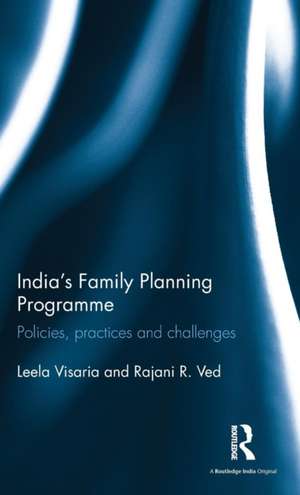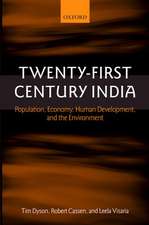India's Family Planning Programme: Policies, practices and challenges
Autor Leela Visaria, Rajani R. Veden Limba Engleză Hardback – 19 ian 2016
Rich in empirical data, this book will be an indispensable resource for scholars, policymakers, organisations and NGOs concerned with population and demographic studies. It will also interest those in sociology, public policy and public health.
| Toate formatele și edițiile | Preț | Express |
|---|---|---|
| Paperback (1) | 436.14 lei 6-8 săpt. | |
| Taylor & Francis – 24 ian 2018 | 436.14 lei 6-8 săpt. | |
| Hardback (1) | 1106.05 lei 6-8 săpt. | |
| Taylor & Francis – 19 ian 2016 | 1106.05 lei 6-8 săpt. |
Preț: 1106.05 lei
Preț vechi: 1348.84 lei
-18% Nou
Puncte Express: 1659
Preț estimativ în valută:
211.67€ • 220.17$ • 174.75£
211.67€ • 220.17$ • 174.75£
Carte tipărită la comandă
Livrare economică 12-26 aprilie
Preluare comenzi: 021 569.72.76
Specificații
ISBN-13: 9781138118980
ISBN-10: 1138118982
Pagini: 204
Ilustrații: 36
Dimensiuni: 138 x 216 x 18 mm
Greutate: 0.36 kg
Ediția:1
Editura: Taylor & Francis
Colecția Routledge India
Locul publicării:Oxford, United Kingdom
ISBN-10: 1138118982
Pagini: 204
Ilustrații: 36
Dimensiuni: 138 x 216 x 18 mm
Greutate: 0.36 kg
Ediția:1
Editura: Taylor & Francis
Colecția Routledge India
Locul publicării:Oxford, United Kingdom
Public țintă
PostgraduateCuprins
List of Figures. List of Tables. List of Abbreviations. Acknowledgement. Preface 1. India’s Shifting Goalposts, Population Policies, Prescriptions and Acceptance of inevitable Reality 2. History of India’s Family Planning Programme from Inception to National Emergency 3. The Tumultuous Period of 1975-1981 and After 4. ICPD Conference and the Paradigm Shift 5. Organization of Family Planning Services 6. Role of the non-governmental sector in family planning 7. Contraceptive use, Dynamics and Unmet Need for Family Planning 8. Proximate Determinants of Fertility 9. Demographic, Socio-cultural and Economic Determinants of Contraceptive Use and Fertility 10. Contraceptive Technology Choices in India’s Family Planning Programme 11. Pathways to Population Stabilization 12. Opportunities and Challenges before India in 21st Century 13. The way forward Epilogue. References.
Notă biografică
Leela Visaria is Honorary Professor and former Director, Gujarat Institute of Development Research, Ahmedabad, India. She has a Ph.D. in Sociology from Princeton University. Her research is in historical demography, health, family planning, education and demographic transition. She has authored several peer-reviewed articles and has co-authored and/or edited six books including Twenty-first Century India: Population, Economy, Human Development and the Environment (2004) and Abortion in India: Ground Realities (2007). She was the first President-elect of the Asian Population Association (2009–10).
Rajani R. Ved is currently Advisor, National Health Systems Resource Center, New Delhi, India. She has a medical degree from Madras Medical College and a Master’s degree in Public Health from Harvard University. Her work focuses on primary health care and women and children’s health. Her research experience and writing deal with implementation issues within health systems.
Rajani R. Ved is currently Advisor, National Health Systems Resource Center, New Delhi, India. She has a medical degree from Madras Medical College and a Master’s degree in Public Health from Harvard University. Her work focuses on primary health care and women and children’s health. Her research experience and writing deal with implementation issues within health systems.
Recenzii
‘This is an authoritative and much-needed study of India’s family planning programme . . . [It] provides us both with important insights regarding . . . past performance and crucial recommendations as to how future family planning activities in the country should proceed.’Tim Dyson, Professor of Population Studies, London School of Economics
‘The book provides an authentic account and insight into India’s family planning programme from inception till today and what lies ahead in terms of demographic challenges and opportunities.’
M. S. Swaminathan, UNESCO Chair in Ecotechnology and Founder Chairman and Chief Mentor, M. S. Swaminathan Research Foundation, Chennai.
‘The book provides an authentic account and insight into India’s family planning programme from inception till today and what lies ahead in terms of demographic challenges and opportunities.’
M. S. Swaminathan, UNESCO Chair in Ecotechnology and Founder Chairman and Chief Mentor, M. S. Swaminathan Research Foundation, Chennai.
Descriere
The volume closely examines the changes, pressures and shifts in India’s family planning programme since its inception in 1952. It outlines the massive increase in India’s population from 361 million in 1951 to 1.21 billion in 2011. The book underlines that the goal of population stabilization cannot be achieved at the cost of the rights of people.













